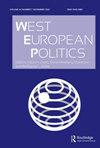实施研究的新途径:烟草控制中的部门和党派斗争
IF 4.5
1区 社会学
Q1 POLITICAL SCIENCE
引用次数: 1
摘要
本文章由计算机程序翻译,如有差异,请以英文原文为准。
New avenues in implementation research: departmental and partisan struggles in tobacco control
Abstract The European Union has developed an ambitious tobacco policy regime. However, this area shows striking differences in national implementation. Although existing research points to some explanations for member state differences, there is still only limited understanding regarding drivers of differentiated implementation. In this study, a method of difference is followed and the article investigates two cases of ‘high performers’ (United Kingdom, Ireland) and two cases of ‘laggards’ (Germany, Austria). In order to explain the differences regarding tobacco control strictness, three explanatory approaches are combined. First, taking a party differences approach, an in-depth analysis of the party positions is conducted, using Comparative Manifesto Data. Second, using a functional approach, policy implementation is assumed to be influenced by portfolio allocation. If the competence for implementing policy lies with economic or agricultural departments, a more liberal approach is expected than if it lies with the health department. Third, a turf approach is used: if the health department has the sole competence for the implementation, stricter (and also more dynamic) regulation is expected than if two or more departments must reach a consensus. Combining administrative science and politics approaches in an innovative way, the article provides novel insights on differentiated implementation.
求助全文
通过发布文献求助,成功后即可免费获取论文全文。
去求助
来源期刊

West European Politics
POLITICAL SCIENCE-
CiteScore
10.00
自引率
7.10%
发文量
58
期刊介绍:
West European Politics (WEP)has established itself as one of the most authoritative journals covering political and social issues in Western Europe. It has a substantial reviews section and coverage of all national elections in Western Europe. Its comprehensive scope, embracing all the major political and social developments in all West European countries, including the European Union, makes it essential reading for both political practitioners and academics.
 求助内容:
求助内容: 应助结果提醒方式:
应助结果提醒方式:


